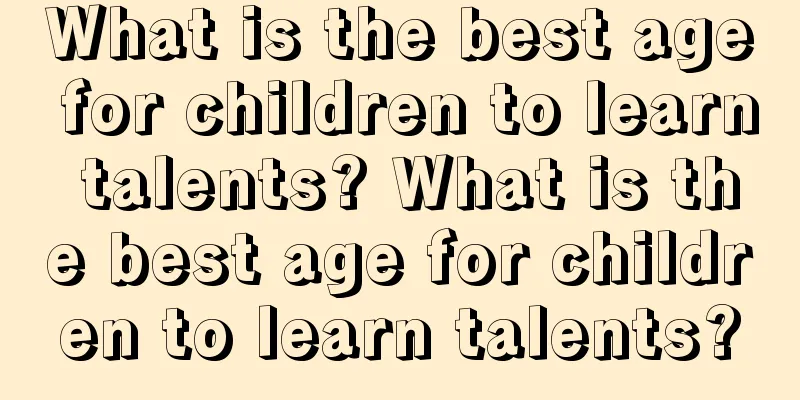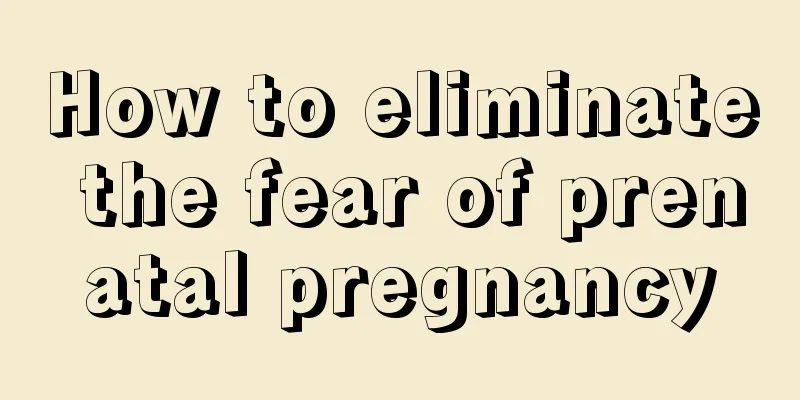What is the best age for children to learn talents? What is the best age for children to learn talents?

|
What is the best age for children to learn talents? Mothers all hope that their children will excel. Therefore, having a talent can not only cultivate children's sentiments, but also enrich their senses. Therefore, many parents hope that they can have a specialty. Let's talk about what is the best age for children to learn specialties. The best age for children to learn talents1. The appropriate age to learn violin The violin is played by standing with one hand holding the violin. It is too difficult for a 3-4 year old child to play good music by himself because his hands and fingers are still small and his strength is not enough. Therefore, it is recommended that the age for learning violin is 5-6 years old. The right age to learn piano. In the world of music, sound has feelings and life. It is not suitable for babies who are too young to learn piano. Because learning piano requires babies to have certain abilities. This includes the baby's cognitive ability developing to a certain level, at least being able to recognize simple musical notation. It also includes a certain degree of auditory differentiation and the ability to perceive music, such as distinguishing the high notes, timbre, and monotony of music, as well as the development of fine hand movements, a certain degree of hand-eye coordination, finger strength, and the size of hand development. Therefore, if children start learning piano at the age of 2-3, the results cannot be expected. If they start learning at the age of 6-10, it will be a little late to become a pianist. It is best to let children listen to and appreciate good music when they are 3-5 years old. Generally, they should start to receive technical guidance on musical instruments such as piano at the age of 4-5, and it is more appropriate to learn piano. Of course, you can start earlier or later depending on your child's situation. 2. The right age to learn painting. Since children can "doodle" at the age of 1 or above, they begin to become interested in shapes and colors at the age of 2-3. At the age of 4-5, children begin to understand and draw real things and things they have experienced. When they are 5-6 years old, they don’t draw what they see, but what they know. At this time, children have high observation skills, imagination, and even desire to express themselves. Therefore, it is most appropriate to start when the child is 2.5 to 3 years old, when he is the purest. 3. The right age to learn drama The so-called drama is to use all the organs and functions of the body to perform, starting from voice and pronunciation exercises to music, classical music, ballet, etc., which requires extensive training. These trainings can be carried out according to age and physical and mental development. Therefore, from the age of 3 to adulthood, as long as one is determined to act, any time can be said to be the "right age". 4. The appropriate age to learn calligraphy Calligraphy is an art that requires a high level of skill. It is not easy to write beautiful and artistic characters. You must learn, practice and progress step by step according to the rules of learning. Only after long-term practice can one master the true essence of calligraphy. One should not be too young to learn calligraphy. It is more appropriate for school-age children to start learning calligraphy from the third grade. Because children at this age have adapted to school life and have a deeper understanding of words, they can start learning. Students in kindergarten and first and second grades of primary school have weaker comprehension abilities. But if you are interested and can continue to learn, it is not too early to start learning during this period. 5. The right age to learn English Early childhood is the best age for oral language development. Normal children can master all the sounds of their mother tongue by the age of four, and can also learn the languages of other ethnic groups. If you want to speak English as well as Chinese in the future, it is better to learn it as early as possible. As you get older, after the age of 5, the habits of your mother tongue have been formed, the pronunciation mechanism has gradually stabilized and is limited to your mother tongue. Learning a foreign language will be interfered by voice and will be much more difficult. Therefore, as long as family conditions permit, it is best for children to learn some foreign language from an early age, start to get close to English at the age of 1-2, and it is better to have formal learning with a teacher after the age of 3. 6. The appropriate age to learn Go and chess The appropriate age to start playing Go and chess is 3-4 years old, as long as the child can distinguish the black and white pieces and understand the words on the pieces. Both games have very difficult technical terms, and if you want to fully understand them, you usually start in the third grade of elementary school... 7. The appropriate age to learn swimming "Swimming training classes" are generally a good way to teach the basics. There are courses for people of all ages, such as "baby swimming classes" for 0-2 years old, "3-year-old children", "toddlers", "school children", "advanced", and "athlete training". Therefore, when the mother wants to "let the child learn to swim" or the child "wants to learn to swim himself", it is the appropriate age to start swimming. 8. The appropriate age to learn gymnastics According to the development of young children, a one-year-old child can dance and shake his body to the rhythm, a two-year-old child can grab things, a three-year-old child can run to the destination, and a four-year-old child can hop on one foot, somersault, and jump lightly on both feet. No matter what age you start gymnastics, the earlier you start, the more likely you are to achieve advanced skills. Generally speaking, it is more appropriate to start gymnastics talent from the age of 3. 9. The right age to learn ice skating Experts and coaches agree that the earlier you learn, the better. Some active skaters start learning ice skating around the age of 4 or around the time they enter primary school. 4-6 years old is the appropriate age to start skating. If you start learning early, it will be like speaking your mother tongue, and you can master the tricks of skating freely and unconsciously. Questions about children's talentsIt seems like he is interested in everything, sometimes listening to music, sometimes drawing, sometimes playing puzzles... but it seems like his interests are short-lived. What should I do? A: Interest is the tendency to pay attention to and choose something over a period of time. Interest will only become a lifelong hobby if it is constantly practiced and reinforced, including external reinforcement (others' praise, envy, etc.) and internal reinforcement (the pleasure you experience). If the child's living environment is relatively rich, and the parents do not deliberately talk about it, and do not reinforce it, the child will pay attention to everything and have relatively broad interests. This is not bad for young children, and the information they receive will be relatively uniform. In fact, most of the "interests" of most children are just curiosity at first. Just let the children get in touch with more, understand more, and try more. Through trying, he will eventually realize what he really likes and is good at, and discover his true interests. With this self-awareness, children will have the desire and desire to actively learn talents from the bottom of their hearts. This motivation will be stable and lasting, and it is the most ideal motivation state for children to learn talents in the future. Principles of children's talent learning1. Don’t take care of everything Many children are not willing to go to special classes. A considerable number of them are arranged by their parents. If children lack interest in the content they are learning, it will not only fail to achieve the desired educational effect, but will hinder their normal development. 2. Not too much Some parents blindly believe that learning more is better than learning less, so they let their children learn piano today, art tomorrow, and calligraphy two days later. No wonder some children would say: "After school, I would rather be kept by the teacher than go home immediately." 3. Don’t force Parents should pay attention to taking advantage of the situation and stimulating their children's interest and desire to learn. However, in fact, quite a number of parents fail to do this. When their children are bored with learning, parents do not guide them step by step, but force them to learn by force. The result is often counterproductive, which just proves the old saying: "A forced melon is not sweet." |
<<: 2017 Science Lesson Plan Kindergarten 2017 Kindergarten Science Experiment
Recommend
What is a pregnancy soup? What are the ingredients of a pregnancy soup?
Have you ever heard of preparing for pregnancy? D...
How to train your baby to eat by himself? How to train your baby to eat by himself
When babies are young, they need to be fed by the...
What are the symptoms of intellectual disability in premature babies? Will premature babies have intellectual disability?
What are the symptoms of intellectual disability ...
What should pregnant mothers do when they have toothache? Can they take medicine for toothache during pregnancy?
Some women have toothaches during pregnancy, but ...
How long will it take for the baby to be born if the amniotic fluid breaks prematurely? Will the stomach hurt if the amniotic fluid breaks prematurely?
If a pregnant woman has premature rupture of memb...
What to do if labor is too painful? Breathing method during labor
After ten months of pregnancy, the baby is finall...
Can pregnant women eat dried cranberries? What are the benefits of eating dried cranberries for pregnant women?
Cranberry is a very good food that can effectivel...
Can I cut my hair after a miscarriage? How long after a miscarriage can I cut my hair?
After a miscarriage, you will be unkempt and your...
Should children's teeth be thrown away? What should children's teeth be filled with?
Children will start to replace their teeth at a c...
Can babies drink rice tea? At what age can babies drink rice tea?
Many people like to feed their babies some liquid...
Reasons why babies hiccup Why do babies usually hiccup?
What are the reasons for baby hiccups? Today, let...
How long after a caesarean section can I sleep with my baby? How long after a caesarean section can I take a shower?
For cesarean section, the wound usually needs to ...
What are the effects of Colgate mouthwash? Can pregnant women use Colgate mouthwash?
Colgate is a brand that is worthy of our trust. I...
What should children do when they have nosebleeds? Two effective ways to stop bleeding
Nosebleed is a very common thing in daily life. S...
What should babies eat to grow teeth quickly? What should they eat to be good for their teeth?
Food has a great impact on baby's teeth. Eati...









